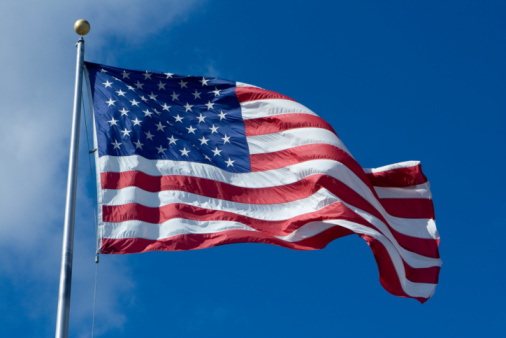If high school football players — or other public school athletes — choose to “take a knee” during upcoming competitions, the First Amendment will support their action.
NFL football differs from public high school football in many ways. Different rules apply — and not just different rules of play. As employees, professional football players can be penalized or even fired for choosing to ignore team or league rules. However, the First Amendment protection of free speech applies to public schools and means students and spectators have a clear right to NOT stand during the national anthem. We can draw that conclusion from the clear line of cases involving standing for the Pledge of Allegiance in public schools.
The U.S. Supreme Court decided 74 years ago that students could not be compelled to recite, nor be compelled to stand, during the recitation of the Pledge of Allegiance: West Virginia State Board of Education v. Barnette, 319 U.S. 624 (1943). In that case, the Supreme Court struck down a resolution that allowed schools to expel students who refused to stand for the Pledge of Allegiance on the basis that refusing to stand constituted an act of insubordination. The court held that forcing students to stand for the pledge constituted compelled speech and violated the First Amendment. In oft-quoted language, Justice Robert Jackson wrote: “If there is any fixed star in our constitutional constellation, it is that no official, high or petty, can prescribe what shall be orthodox in politics, nationalism, religion, or other matters of opinion or force citizens to confess by word or act their faith therein.”
The courts have consistently upheld this idea that schools cannot compel students to speak by forcing them to stand.
- Banks v. Bd. of Public Instruction, 314 F. Supp. 285, 294-96 (S.D.Fla.1970), aff’d, 450 F.2d 1103 (5th Cir.1971) concluded that a rule requiring students to stand during the pledge was unconstitutional.
- Holloman ex rel. Holloman v. Harland, 370 F.3d 1252, 1274, 1278 (11th Cir.2004) noted that the right to remain seated and silent during the pledge is clearly established.
- Frazier v. Winn, 535 F.3d 1279, 1281-83 (11th Cir. 2008) found that all Florida public school students “at all grade levels from kindergarten to 12th grade” have the First Amendment right not to stand during the Pledge of Allegiance.
Many public schools have made this right clear through district policy. For example, the Fargo (N.D.) Public Schools policy states that the district “recognizes that the beliefs of some students and teachers prohibit their participation in these patriotic exercises. No person shall be required to salute, stand or otherwise participate in this exercise if it is against his/her beliefs.”
This is quite different from the NFL policy, which states: During the National Anthem, players on the field and bench area should stand at attention, face the flag, hold helmets in their left hand, and refrain from talking …. Failure to be on the field by the start of the National Anthem may result in discipline, such as fines, suspensions, and/or the forfeiture of draft choices(s) for violations of the above, including first offenses.”
Educators who wonder how to respond if athletes and spectators begin to kneel or remain seated during the anthem would be wise to heed a long record of legal rulings about the First Amendment protections in such situations.
Citation: Underwood, J. (2017). Kneeling during the national anthem: At schools, it’s protected speech. Phi Delta Kappan.
ABOUT THE AUTHOR

Julie Underwood
Julie Underwood is the Susan Engeleiter Professor of Education Law, Policy, and Practice at the University of Wisconsin-Madison.










